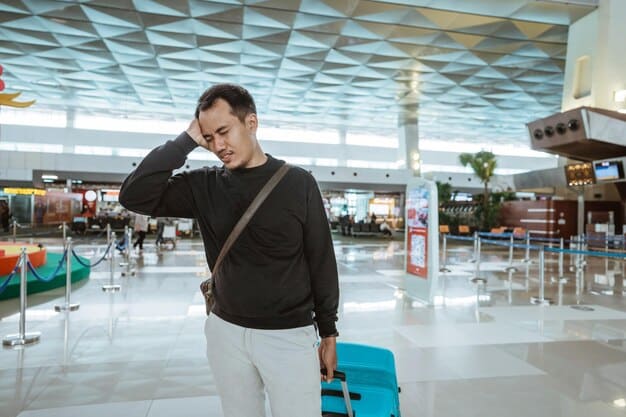Airline Baggage Fee Increase: How to Budget for New Travel Costs

Airline Baggage Fee Updates: How the New 12% Average Increase Impacts Your Travel Budget requires travelers to rethink their financial strategies. This guide offers insights on mitigating these rising costs and planning your travel budget effectively.
Traveling can be an enriching experience, but it also comes with its share of expenses. Recently, many airlines have updated their baggage fees, leading to an average increase of around 12%. This change can significantly impact your travel budget, especially if you’re not prepared.
Understanding these increases and planning accordingly is crucial to avoid unexpected costs and ensure a smoother travel experience. Let’s explore how these Airline Baggage Fee Updates: How the New 12% Average Increase Impacts Your Travel Budget can affect you and what you can do about it.
Understanding the Airline Baggage Fee Landscape
The airline industry is constantly evolving, and one aspect that sees frequent changes is baggage fees. These fees can vary widely depending on the airline, the route, and the type of ticket you purchase. Staying informed about these changes is essential to manage your travel expenses effectively.
Factors Influencing Baggage Fees
Several factors influence how airlines set their baggage fees. These include competition, fuel costs, and the desire to generate additional revenue streams. Let’s break down some key elements:
- Airline Type: Budget airlines often have lower base fares but higher baggage fees compared to full-service carriers.
- Route: International flights may have different baggage allowances and fees than domestic ones.
- Ticket Class: Higher ticket classes (e.g., business or first class) usually include free checked baggage.
- Loyalty Programs: Frequent flyer programs can offer baggage fee waivers or discounts as a perk.
Understanding these factors can help you choose flights that align with your budget and travel needs.
Many major airlines, including United, Delta, and American Airlines, have increased their baggage fees in recent months. These increases typically affect both checked baggage and oversized or overweight items. Keeping an eye on airline announcements and travel advisories can help you stay ahead of these changes.
In conclusion, navigating the landscape of airline baggage fees requires awareness and planning. By understanding the factors that influence these fees, you can make informed decisions and avoid unexpected expenses during your travels. Make sure to check the latest Airline Baggage Fee Updates: How the New 12% Average Increase Impacts Your Travel Budget before you book your next flight.
How the 12% Average Increase Affects Your Wallet
The 12% average increase in airline baggage fees might seem small at first glance, but it can add up quickly, especially for families or those traveling with multiple bags. Understanding the real-world impact on your travel budget is crucial for effective planning.
Breaking Down the Costs
To illustrate the impact, let’s consider a hypothetical scenario: a family of four traveling round-trip with one checked bag each. Before the fee increase, they might have paid $30 per bag each way, totaling $240. With a 12% increase, the fee could rise to $33.60 per bag each way, bringing the total to $268.80. This represents an additional cost of $28.80, which could be better spent on other aspects of the trip.
Beyond the basic fees, there are additional charges to consider. These include overweight baggage fees, which can range from $100 to $200 per bag, and oversized baggage fees for items like sports equipment. Failure to account for these potential costs can lead to significant financial strain during your trip.
Several real-life examples demonstrate how these fee increases can impact different types of travelers. For instance, a student traveling with two checked bags might find the extra cost prohibitive, while a business traveler with elite status might not be affected at all. Analyzing these scenarios can provide a clearer picture of how Airline Baggage Fee Updates: How the New 12% Average Increase Impacts Your Travel Budget influence various travel profiles.
Ultimately, the 12% average increase in airline baggage fees underscores the importance of budgeting and planning. By understanding how these costs accumulate, you can make informed decisions and avoid financial surprises. Check all the Airline Baggage Fee Updates: How the New 12% Average Increase Impacts Your Travel Budget before you travel.

Smart Strategies to Avoid Baggage Fees
While airline baggage fees are on the rise, there are several smart strategies you can employ to avoid these extra costs. These approaches range from packing smarter to leveraging airline loyalty programs, each offering a unique way to save money.
Effective Packing Techniques
One of the most straightforward ways to avoid baggage fees is to pack lighter. Here are some useful techniques:
- Use a Carry-On: Opt for a high-quality carry-on bag and maximize its space with rolling techniques.
- Wear Bulky Items: Wear your heaviest shoes, jackets, and sweaters on the plane.
- Utilize Packing Cubes: These can help compress your clothes and keep your suitcase organized.
- Buy Travel-Sized Products: Purchase smaller toiletries and personal care items to save space and weight.
Leveraging Airline Loyalty Programs and Credit Cards
Many airlines offer baggage fee waivers as part of their loyalty programs. Here’s how you can take advantage:
- Elite Status: Achieving elite status often comes with perks like free checked bags.
- Co-branded Credit Cards: Some airline credit cards offer free baggage allowances as a cardholder benefit.
- Miles and Points: Use your miles or points to cover baggage fees or upgrade to a higher ticket class with included baggage.
Choosing the right credit card and strategically using loyalty programs can result in significant savings on baggage fees.
Consider alternative shipping options for items you don’t need immediately upon arrival. Services like USPS, FedEx, and UPS offer cost-effective solutions for shipping luggage and other belongings. While this requires some advance planning, it can be a cheaper option than paying airline baggage fees, particularly for longer trips. Stay informed about Airline Baggage Fee Updates: How the New 12% Average Increase Impacts Your Travel Budget and plan accordingly.
In summary, avoiding airline baggage fees requires a combination of smart packing, leveraging loyalty programs, and considering alternative shipping options. By implementing these strategies, you can keep more money in your pocket and enjoy a more affordable travel experience. Always check the Airline Baggage Fee Updates: How the New 12% Average Increase Impacts Your Travel Budget to make the most informed decisions.
Comparing Airline Baggage Fee Policies
Airline baggage fee policies can vary significantly, making it essential to compare them when booking your flights. Knowing the specifics of each airline’s policy can help you make informed decisions and avoid unexpected costs.
Key Differences Among Major Airlines
Let’s compare the baggage fee policies of some major U.S. airlines:
- United Airlines: Known for increasing fees on many routes, United charges around $35 for the first checked bag and $45 for the second on domestic flights.
- Delta Air Lines: Delta’s fees are similar, with the first checked bag costing about $30-$35 and the second around $40-$45 for domestic routes.
- American Airlines: Typically matches Delta’s pricing structure, with similar fees for both first and second checked bags.
- Southwest Airlines: Unique for offering two free checked bags for all passengers, making it a popular choice for budget-conscious travelers.
These policies are subject to change, so always verify the latest information on the airline’s website.
The cost of overweight and oversized baggage can be substantial. Most airlines charge between $100 and $200 for bags exceeding weight or size limits. To avoid these fees, weigh and measure your bags at home before heading to the airport. If your bag is close to the limit, consider redistributing items or using a larger suitcase. Knowing the fees for Airline Baggage Fee Updates: How the New 12% Average Increase Impacts Your Travel Budget helps when you are packing.
Consider the total cost of your trip, including baggage fees, rather than just focusing on the base fare. A lower fare might seem attractive, but high baggage fees can quickly negate those savings. Airlines like Southwest, with their free checked bag policy, can offer significant value for travelers with multiple bags. Always factor in these costs when comparing flight options.
In conclusion, comparing airline baggage fee policies is a crucial step in planning your trip. By understanding the differences in fees, weight limits, and included allowances, you can choose the airline that offers the best value for your specific needs. Make sure you are aware of the Airline Baggage Fee Updates: How the New 12% Average Increase Impacts Your Travel Budget.

Budgeting Tips for Travel with Increased Baggage Fees
With airline baggage fees on the rise, creating a comprehensive travel budget is more important than ever. Effective budgeting can help you manage costs and ensure a more enjoyable travel experience. These new Airline Baggage Fee Updates: How the New 12% Average Increase Impacts Your Travel Budget will require some adjusting.
Creating a Detailed Travel Budget
Start by listing all potential expenses, including airfare, accommodation, meals, transportation, activities, and baggage fees. Be realistic with your estimates, and add a buffer for unexpected costs. Tools like spreadsheets or budgeting apps can help you track your spending and stay within your budget.
Allocate a specific amount for baggage fees based on your travel plans. If you anticipate needing to check bags, research the airline’s fees and factor them into your budget. Consider setting aside a contingency fund to cover any unexpected baggage charges, such as overweight fees. This proactive approach can prevent financial surprises during your trip.
Look for ways to save money on other travel expenses to offset the increased baggage fees. Here are a few ideas:
- Accommodation: Consider staying in hostels or vacation rentals instead of hotels.
- Meals: Cook some of your own meals instead of eating out every day.
- Transportation: Use public transportation or walk instead of taking taxis.
- Activities: Look for free or low-cost activities, such as visiting parks or museums on free admission days.
By cutting costs in other areas, you can balance your budget and accommodate the increased baggage fees. These alternatives to Airline Baggage Fee Updates: How the New 12% Average Increase Impacts Your Travel Budget can help.
In summary, adapting to increased baggage fees requires careful budgeting and a willingness to make adjustments. By creating a detailed travel budget, allocating funds for baggage fees, and finding ways to save on other expenses, you can manage your costs effectively and enjoy a stress-free trip. Always consider the Airline Baggage Fee Updates: How the New 12% Average Increase Impacts Your Travel Budget when you plan your trip.
The Future of Airline Baggage Fees
As the airline industry continues to evolve, the future of baggage fees remains uncertain. Several factors could influence how airlines approach baggage charges in the coming years, impacting travelers worldwide. With these Airline Baggage Fee Updates: How the New 12% Average Increase Impacts Your Travel Budget, we should consider the future.
Potential Trends and Predictions
One potential trend is the further unbundling of airline services, with more fees for amenities that were once included in the base fare. This could mean additional charges for seat selection, in-flight entertainment, and even carry-on bags. Airlines may also implement dynamic pricing for baggage fees, with costs fluctuating based on demand and availability.
How Technology Might Influence Baggage Handling
Technological advancements could streamline baggage handling and potentially reduce costs for airlines. Innovations like RFID tracking, automated baggage systems, and mobile check-in could improve efficiency and lower operational expenses. This could, in turn, influence baggage fee policies, although the exact outcome remains to be seen.
Staying adaptable is key in the face of evolving airline baggage fee policies. Here’s how you can prepare:
- Stay Informed: Regularly check airline websites for the latest fee updates.
- Be Flexible: Consider alternative travel dates or routes to find lower fees.
- Plan Ahead: Pack smartly and utilize loyalty programs to minimize costs.
In conclusion, the future of airline baggage fees is likely to be dynamic, with ongoing changes influenced by industry trends, technological advancements, and consumer behavior. By staying informed and adaptable, travelers can navigate these changes effectively and minimize the impact on their travel budgets. It’s important to stay informed about Airline Baggage Fee Updates: How the New 12% Average Increase Impacts Your Travel Budget.
| Key Point | Brief Description |
|---|---|
| 💰 Fee Increase | Airlines raised baggage fees by an average of 12%. |
| 🧳 Pack Light | Use carry-ons to avoid check-in fees. |
| ✈️ Loyalty Programs | Elite status can waive baggage fees. |
| ⚖️ Compare Policies | Fees vary; compare before booking. |
Frequently Asked Questions
The 12% average increase in baggage fees can significantly raise your overall travel costs, especially if you check multiple bags. Budgeting and planning are essential to mitigate these expenses.
You can use a carry-on, wear bulky items, use packing cubes, leverage airline loyalty programs, or ship your luggage via USPS, FedEx, or UPS.
Southwest Airlines is notable for offering two free checked bags for all of their passengers, which can be a significant advantage for travelers.
Check the airline’s official website for the most current information on baggage fees, sizes, and weights that are permitted. These policies are dynamic, so double-check right before your trip.
Yes, many airline co-branded credit cards offer free baggage allowances as a cardholder benefit. Research options to determine if one would work out with your anticipated amount of travel to reduce impact by Airline Baggage Fee Updates: How the New 12% Average Increase Impacts Your Travel Budget.
Conclusion
In conclusion, staying informed about Airline Baggage Fee Updates: How the New 12% Average Increase Impacts Your Travel Budget is crucial for effective travel planning. By understanding the factors influencing these fees and adopting smart strategies, you can mitigate their impact on your budget.





